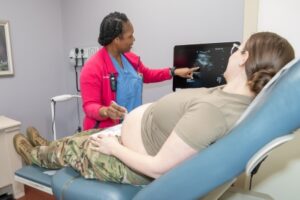
Earlier this year, Lt. Col. Francesca Desriviere, a Certified Nurse Midwife at MACH conducts an abdominal ultrasound during a routine obstetrics appointment at Martin Army Community Hospital at Fort Benning, GA. MHS and VA policies on IVF treatment for servicemembers having problems getting pregnant have sparked lawsuits. Photo by Ronald Mooney
NEW YORK — A lawsuit filed recently in federal court in Manhattan challenges the eligibility policies of DoD and VA for who can receive in vitro fertilization (IVF) care, calling them discriminatory.
The suit from the Veterans Legal Services Clinic at Yale Law School and the Reproductive Rights and Justice Project is seeking a judge’s order to find it discriminatory and unconstitutional to deny treatment on the basis of sex, sexual orientation, marital status and the cause of infertility.
DoD and VA have strict policies on who can seek IVF care at their facilities. Both agencies require servicemembers and veterans to be legally married, able to produce the necessary gametes with their spouse and have a significant service-connected injury impacting fertility. Active-duty servicemembers without an injury can seek IVF at one of the handful of military treatment facilities that offer it but will have to pay out of pocket.
Meanwhile, VA’s policies very specifically excludes same-sex couples, stating, “This benefit is limited to a cisgender, opposite-sex, legally married couple or other legally married couple with opposite-sex games/productive organs. This means lawfully married same-sex couples are ineligible for this benefit.”
“As a result, same-sex and unmarried couples and single service members or veterans are denied coverage, in violation of federal statutory and constitutional anti-discrimination protections and fundamental rights,” according to a statement from the Veterans Service Legal Clinic. “Due to toxic exposures, combat stress, and delays due to service obligations, military service leaves many veterans and service members with limited family-building options. Fertility services are an essential means of supporting military and veteran families.”
The VA’s IVF policy has been heavily criticized since its inception, from its limitation to opposite-sex, legally married couples, to the difficulty of proving service-connection for infertility.
“My service came with severe injuries, leaving me disabled and unable to carry a child due to damage to my ribs, sternum, spine and torso,” explained Lindsay Church, a veteran and executive director of Minority Veterans of America, who was quoted in a press release. “Despite my service-connected disability, my spouse and I do not have access to vital fertility treatments, such as IVF, because my disabilities are not to my reproductive system, and we are in a same-sex marriage. Our family has joined NOW-NYC’s legal challenge because we believe that every individual, regardless of their marital status, sexual orientation or the nature of their disability, deserves equal treatment under the law.”
Some members in Congress have been working to close this gap at VA for some time. Rep. Julia Brownley (D-CA), co-chair of the Women Veteran Task Force, introduced the Veterans Infertility Treatment Act, which would require VA to provide IVF to any veteran or partner unable to achieve pregnancy and repeal the banned use of donated gametes and embryos.
According to Brownley’s office, infertility is the only medical condition VA is prohibited from treating without a direct service connection, and veterans the department refuses to treat face the choice of paying prohibitive out-of-pocket IVF costs or losing valuable time pursuing that service connection. The bill has remained in subcommittee since February.
A second lawsuit was filed in Boston against the VA by Air Force veteran Ashley Sheffield, who was rejected for IVF because she’s married to a woman, despite having injuries from service that have caused her to develop conditions affecting her fertility.
“I am shocked and disappointed that the VA is denying me and other veterans IVF benefits because we’re in same-sex marriages,” Sheffield said in a statement, “We are entitled to equal treatment, and we should no longer be treated as second-class citizens.”
Michael Stefanilo Jr., one of the lawyers filing the suit said, “Ten years ago, the Supreme Court struck down the Defense of Marriage Act because that heinous law treated same-sex marriages as invalid and dehumanized LBGTQ+ people. There is no excuse for the VA breathing new life into the bigotry LGBTQ servicemembers and veterans have faced for hundreds of years.”
VA and DoD have yet to comment on the lawsuits.

